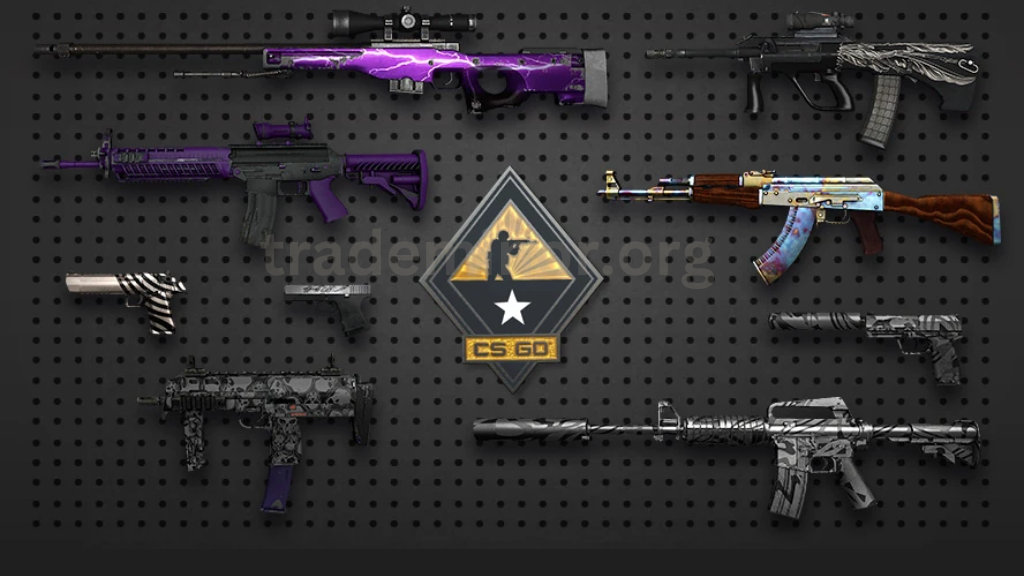In the world of online gaming, Counter-Strike: Global Offensive (CS:GO) has emerged as one of the most popular first-person shooter games, known for its competitive gameplay and vibrant community. Within CS:GO, skins are virtual cosmetic items that alter the appearance of in-game weapons and characters. These skins have become highly sought after by players, not only for their aesthetic appeal but also for their rarity and status symbol within the gaming community.
Simultaneously, cryptocurrency has gained traction as a decentralized digital currency that offers secure and efficient transactions without the need for intermediaries like banks. The convergence of these two trends has led to a growing phenomenon: buying CS:GO skins with cryptocurrency. This article explores the benefits, challenges, and intricacies of this emerging trend.
Benefits of Buying CS:GO Skins with Cryptocurrency
Security and Anonymity: One of the primary benefits of using cryptocurrency to purchase CS:GO skins is the enhanced security and anonymity it provides. Cryptocurrency transactions are encrypted and decentralized, reducing the risk of fraud or identity theft associated with traditional payment methods.
Lower Transaction Fees: Compared to traditional payment methods like credit cards or bank transfers, cryptocurrency transactions typically involve lower fees. This can result in cost savings for buyers when purchasing CS:GO skins, especially for high-value items.
Faster Transactions: Cryptocurrency transactions are processed more quickly than traditional payment methods, enabling buyers to receive their CS:GO skins almost instantly after completing a purchase. This eliminates the waiting period associated with bank transfers or payment processing delays.
Global Accessibility: Cryptocurrency transcends geographical boundaries and can be used for transactions worldwide. This global accessibility expands the market for CS:GO skins, allowing buyers and sellers from different regions to participate in trading activities.
Potential for Price Appreciation: Some cryptocurrencies have experienced significant price appreciation over time. By purchasing CS:GO skins with cryptocurrency, buyers may benefit from potential price appreciation, adding an investment element to their gaming hobby.
Understanding CS:GO Skins
Definition and Types of CS:GO Skins: CS:GO skins are virtual cosmetic items that alter the appearance of weapons and characters in the game. They come in various types, including consumer-grade, industrial-grade, classified, restricted, covert, and extraordinary, with each type reflecting different levels of rarity and value.
Rarity and Value Factors: The rarity and value of CS:GO skins are influenced by factors such as their condition (Factory New, Minimal Wear, Field-Tested, Well-Worn, Battle-Scarred), exterior quality, float value, and unique patterns or stickers. Rare or limited-edition skins are often more valuable and sought after by collectors.
Popular CS:GO Skins in Demand: Certain CS:GO skins have achieved iconic status within the gaming community due to their visual appeal, rarity, or historical significance. Examples include the AWP Dragon Lore, M4A4 Howl, Karambit Fade, and AK-47 Fire Serpent, which command high prices in the skin market.
Marketplaces for Buying and Selling CS:GO Skins: Several online marketplaces specialize in facilitating the buying and selling of CS:GO skins, providing users with a platform to browse, list, and trade skins with other players. These marketplaces offer a wide selection of skins, competitive prices, and secure transaction mechanisms.
The Rise of Cryptocurrency in Gaming
Introduction to Cryptocurrency in Gaming: Cryptocurrency has gained significant traction in the gaming industry, with more developers and players embracing digital currencies for in-game transactions, purchases, and rewards. The integration of cryptocurrency in gaming ecosystems offers several advantages, including enhanced security, reduced transaction costs, and increased player autonomy.
In-Game Purchases and Microtransactions: Many gaming platforms now accept cryptocurrency for in-game purchases, allowing players to buy virtual items, expansions, or premium content using digital currencies like Bitcoin, Ethereum, or Litecoin. This seamless integration enables gamers to access additional content without relying on traditional payment methods.
Blockchain-based Gaming Platforms: Some developers are leveraging blockchain technology to create decentralized gaming platforms where players can trade virtual assets, earn cryptocurrency rewards, and participate in decentralized autonomous organizations (DAOs). These blockchain-based gaming platforms offer transparency, ownership rights, and interoperability across different games.
Tokenization of In-Game Assets: Blockchain technology enables the tokenization of in-game assets, such as skins, weapons, or characters, creating unique digital tokens that represent ownership rights. Players can buy, sell, or trade these tokens on decentralized exchanges, fostering a vibrant secondary market for virtual assets.
Player Empowerment and Ownership: Cryptocurrency in gaming empowers players by giving them full ownership and control over their virtual assets. Unlike traditional gaming platforms where items are controlled by centralized entities, blockchain-based games provide players with true ownership rights and the ability to transfer assets across different platforms.
Challenges and Considerations
Volatility and Price Fluctuations: Cryptocurrency markets are known for their volatility, with prices fluctuating rapidly based on market demand, investor sentiment, and regulatory developments. This volatility can impact the value of in-game assets purchased with cryptocurrency, posing risks for players and investors.
Regulatory Uncertainty: The regulatory landscape surrounding cryptocurrency in gaming is still evolving, with regulatory authorities worldwide grappling with issues such as taxation, money laundering, and investor protection. Uncertainty regarding regulatory compliance and legal risks may deter gaming companies from fully embracing cryptocurrency integration.
Security Concerns and Risks: While cryptocurrency transactions offer enhanced security compared to traditional payment methods, they are not immune to security risks such as hacking, fraud, or phishing attacks. Players must take precautions to secure their digital wallets and private keys to prevent unauthorized access to their funds.
Scams and Ponzi Schemes: The decentralized nature of cryptocurrency markets has led to an increase in scams, Ponzi schemes, and fraudulent projects targeting gamers and investors. Players should exercise caution when participating in initial coin offerings (ICOs), token sales, or online trading platforms to avoid falling victim to scams.
Integration and Adoption Challenges: Despite the potential benefits of cryptocurrency in gaming, widespread adoption faces several challenges, including technical barriers, user interface complexities, and resistance from traditional gaming companies. Overcoming these challenges will require collaboration between blockchain developers, gaming companies, and regulatory authorities.
Future Outlook and Opportunities
Continued Innovation and Development: The intersection of cryptocurrency and gaming presents exciting opportunities for innovation and development in both industries. Developers are exploring new ways to leverage blockchain technology, non-fungible tokens (NFTs), and decentralized finance (DeFi) to create immersive gaming experiences and novel monetization models.
Emergence of Play-to-Earn Games: Play-to-earn (P2E) games, where players can earn cryptocurrency rewards for their in-game activities and achievements, are gaining popularity in the gaming community. These games offer financial incentives for players to invest time and effort into gameplay, blurring the lines between gaming and earning income.
Mainstream Adoption and Integration: As awareness and acceptance of cryptocurrency grow, mainstream gaming platforms and publishers may increasingly integrate digital currencies into their ecosystems. This could lead to broader accessibility, liquidity, and utility for cryptocurrency in gaming, paving the way for a more decentralized and inclusive gaming economy.
Community-driven Initiatives: Community-driven initiatives, such as decentralized autonomous organizations (DAOs) and gaming guilds, are leveraging blockchain technology to empower players, foster collaboration, and drive collective decision-making in gaming communities. These initiatives promote decentralization, transparency, and community ownership in the gaming industry.
Conclusion
In conclusion, the integration of cryptocurrency into the gaming industry represents a paradigm shift in how players interact with virtual assets, economies, and ecosystems. From in-game purchases and microtransactions to blockchain-based gaming platforms and tokenized assets, cryptocurrency offers new opportunities for player empowerment, ownership, and engagement.
While challenges such as volatility, regulatory uncertainty, and security risks persist, the potential benefits of cryptocurrency in gaming are undeniable. As developers, players, and investors continue to explore the possibilities of blockchain technology and decentralized finance, the future of gaming looks increasingly decentralized, transparent, and inclusive.
Ultimately, the convergence of cryptocurrency and gaming is reshaping the way we perceive digital ownership, value, and interaction in virtual worlds. As the industry evolves and innovates, we can expect to see further integration, adoption, and experimentation with cryptocurrency-driven gaming experiences, unlocking new levels of creativity, community, and economic empowerment for players worldwide.

